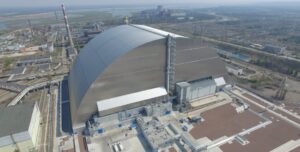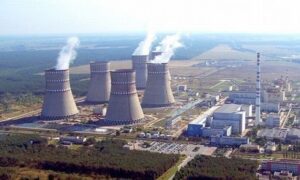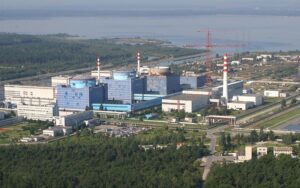
The presence of specialists from the International Nuclear Energy Agency (IAEA) at Ukraine’s nuclear facilities is very important, and they will arrive there in the very near future, primarily at the Chornobyl nuclear power plant, Director General of the agency Rafael Mariano Grossi HAS said.
“We see this as a step in the right direction. We are going to be there very soon, because in Chernobyl there is a lot of work to be done,” he said at a press conference in Vienna on Friday, following visits to Ukraine and Russia March 29 through March 31.
According to him, at this facility, due to power outages or physical damage, there could be a lot of things that could be turned off or fail. At the same time, during the occupation, remote monitoring of radiation indicators did not work.
Ukrainian specialists know how to do their job. But this does not mean that international assistance and cooperation will be superfluous, Grossi said.
According to him, the experience of operating nuclear power plants in the conditions of hostilities has shown that assessing the situation on the spot is much more reliable and efficient than using information from other sources.
In addition, the head of the agency added, it is necessary to check the safety of nuclear material. There are some things that can only be done by IAEA experts, Grossi added.
According to him, he does not know for what reason the Russian troops left the Chornobyl nuclear power plant. They did not tell him about why they left. He said that this could be the decision of the military authorities. And this is not what we discussed with the Russian side in Kaliningrad after a visit to Ukraine, the head of the IAEA said.
He called the general radiation situation around the Chornobyl nuclear power plant quite normal, while allowing some increase in radiation indicators during the withdrawal of troops, which was also observed during their entry to the plant site.
There was a relatively elevated level of localized radiation due to the movement of heavy vehicles during the occupation of the station. And, apparently, this could take place again at the exit, Grossi said.
He confirmed that he had heard about the possibility of radiation contamination of some of the Russian military, but noted that he had no evidence of this.
As for the provision of assistance to Ukraine, according to Grossi, due to hostilities, it may be complicated. However, the IAEA will try to provide it, he said.
In the case of Chornobyl, it is one thing, and in the case of the other plants, it is about the distance and the military situation. One of them remains under the control of the Russian forces. So this will undoubtedly require a different approach, but nothing makes Grossi think that this impossible to do, the head of the IAEA said.
He did not specify what kind of assistance could be discussed, referring to ongoing negotiations with the Ukrainian side on this issue, and asked journalists to be patient.
Commenting on the progress of his initiative on the necessary steps to reduce risks at Ukrainian nuclear facilities, Grossi said that he had abandoned the idea of a trilateral plan in favor of working on a bilateral basis.

National Nuclear Generating Company Energoatom plans to sign an agreement with the French operator of nuclear power plants Electricite de France SA (EDF) on cooperation in the development of nuclear energy, Head of the company Petro Kotin has said.
“Today, we are preparing a memorandum with EDF on cooperation in the development of nuclear energy in Ukraine and in the world. A lot of issues are being worked out there regarding the current operation of units, equipment modernization, personnel training, as well as the development of nuclear facilities in the future. Now we have provided them with our version of the memorandum, they are considering it,” Kotin said in a commentary to Energy Reform during a visit to the Central Spent Nuclear Fuel Storage Facility.
He said he met with Head of EDF Jean-Bernard Levy at a nuclear exhibition in Paris (November-December 2021), where it was agreed on the need to establish cooperation.
According to Kotin, it can become fruitful and profitable for both companies.
“EDF is the world’s largest operator of nuclear power plants. If we produced 86 billion kWh last year, which is the highest result in the last six years, then they produced 360 billion kWh. But we are the second in terms of electricity production in Europe, except for the Russian Federation,” the head of Energoatom said.
At the same time, he admitted that cooperation with EDF could eventually extend to the development of small modular reactors in Ukraine.
“Now this issue is dealt with by many companies, all large organizations that have expertise in this area. Some have conceptual solutions at the stage of coordination with regulatory authorities, many are still at the concept stage,” Kotin explained, adding that “the horizon for the use of small modular reactors is another six-eight years.”
As reported with reference to Deputy Head of the President’s Office Rostyslav Shurma, Ukraine plans to cooperate with French EDF, in particular, in the construction of new units of nuclear power plants (NPPs) in the country.
EDF operates more than 70 nuclear reactors, including 58 in France, and is among the world’s largest nuclear power plant operators. In addition, EDF owns stakes in generating companies in many European countries, the USA, Brazil, Chile, Mexico, China, India, and Morocco.

Westinghouse (the United States) and National Nuclear Generating Company Energoatom have signed two cooperation agreements providing for the start of projects for the construction of two new reactors at Khmelnytsky NPP using AP1000 technology.The documents were signed during the international conference Atomic Opportunities for National Development on Monday in Kyiv.As an Interfax-Ukraine correspondent reported, one of the agreements provides for the purchase of services from the U.S. company for the design of reactors, the other for the purchase of a simulator and equipment with a long service life.According to Petro Kotin, Acting President of Energoatom, the purchase of the simulator in advance will make it possible to train personnel long before the reactors are put into operation.”AR 1000 is a new technology for us. Right now we need to start training inspectors so that they can then start training personnel. We don’t want to waste time on this later, so we buy the simulator first of all,” Kotin said.In addition, the agreement provides for advance financing of equipment that has a long manufacturing cycle.”This is done in order not to delay construction. Some equipment has been manufactured for about three years,” the head of Energoatom explained.Kotin added that the agreements with Westinghouse also provide for the preparation of pilot projects for the construction of reactors, in particular, the preparation of infrastructure and testing of the site where they will be located.In turn, as Minister of Energy Herman Haluschenko said, the agreements signed with Westinghouse are extremely important, since the AP 1000 reactors are unlicensed in Ukraine.”I would not like the licensing issue to drag on. And this is a huge work, it is necessary to process a colossal array of documents. Therefore, we do everything as quickly as possible. And we received assurances from the U.S. side of their as much as possible assistance,” Haluschenko said.As reported, within the framework of the September visit of the President of Ukraine to the United States, Energoatom and U.S. Westinghouse Electric signed a memorandum on the construction of a total of five reactors in Ukraine. The cost of the project will be about $25 billion.

Acting President of National Nuclear Generating Company Energoatom Petro Kotin announced an unprecedented restriction of nuclear energy generation on May 27.
“Today, the restrictions imposed on us by the government in electricity generation have fallen to historic lows, namely, to 6.63 GW from 9.49 GW available,” he wrote on Facebook on Wednesday through the Energy Reform Internet portal.
Kotin is confident that this “is unlikely to contribute to solving the financial issues of the company and the stability of the country’s power market.”
According to the data on the company’s website, on May 27, some 10 out of 15 power units of Ukrainian nuclear plants were in operation.